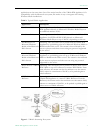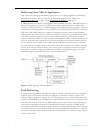
viii Preface
Getting Help
If you need help, or more information about any topic, use the online help system. The
online help is cross-referenced and searchable and can usually find the information in a few
seconds. Use the tree controls in the left pane to open documents and the up and down
arrows to page through them. Use the
Search box to find specific information. Simply enter
one or more words in the box and press Enter. The search results will return pages that have
all of the words you entered—highlighted in yellow (Internet Explorer only). The
Search box
is not case-sensitive and does not recognize articles (a, an, the), operators (+ and – ), or
quotation marks. You can narrow the search by adding words.
If you can't find the information you need from the online help, or from your certified
VBrick reseller, you can contact VBrick Support Services
on the web. Support Services can
usually answer your technical questions in 24 business hours or less. Also note that our
publications team is committed to accurate and reliable documentation and we appreciate
your feedback. If you find errors or omissions in any of our documents, please send e-mail to
documentation@vbrick.com
and let us know. For more information about any VBrick
products, all of our product documentation is available on the web. Go to www.vbrick.com/
documentation to search or download VBrick product documentation.
Getting the Best Video
Video quality is a subjective concept that depends on a variety of factors. VBrick's
philosophy is to make our network appliances as flexible as possible so they can be used
effectively in different applications on a wide variety of networks. This means you can
configure an appliance for maximum performance but you can also configure it in such a way
that it will only work well in a very limited environment. Video quality is also relative. What is
acceptable quality for a surveillance application on a low-bandwidth network is most likely
unacceptable for a corporate presentation or a two-way video conference on a high-speed
LAN. Much depends on your network, the bandwidth you have available, and the audience
you are trying to reach.
VBrick tries to anticipate as many obstacles and limitations as possible and provides custom-
designed MPEG-4 and WM (Windows Media) templates for a variety of applications. These
templates are designed to provide the highest quality audio and video—using bit rate, frame
rate and resolution settings that are tailored for a variety of common network environments.
We encourage you to override specific template settings in order to meet the unique
requirements of your own site, but in doing so, be aware that you can also degrade the quality
and/or performance of the audio and video you are trying to deliver.
For best results, start with a pre-built template and then adjust the bit rate, frame rate,
resolution, and other parameters with care. Experiment with different settings to see the
trade-offs in quality and performance. You can track your changes by periodically saving the
configuration file using the
Read/Write option on the Maintenance page in IWS. If the audio
and video quality is still less than you would expect, re-apply one of the standard templates
and try again. Keep in mind that the VBrick is stable, reliable and flexible. In most cases a
small amount of experimentation will help you find the configuration settings that will deliver
the best audio and video your network can support. For more information, or help
configuring your appliance, contact VBrick Support Services
.
Stream Prioritization describes the Windows Media Player logic that determines what
stream the player will select and play when multiple bit rates are
configured.


















